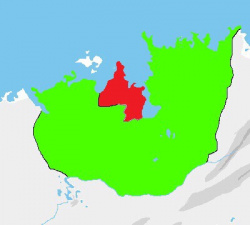Archive:Ebo Aga Empire
 | This article or section is out of date. A country/countries relevant to this article have been removed from Sahar and have been retconned. Not everything here may still be considered canonical. This page was last edited by Ava (talk | contribs) 3 years ago. (Update) |
| The Ebo Aga Empire Ebo Aga |
||
|---|---|---|
| Government | Monarchy | |
| b. | ... | |
The Ebo Aga Empire was a great empire that existed between 1472 AD and 1710 AD, when it eventually fragmented into five kingdoms, the kingdoms are known collectively as The Five Ebo Aga Kingdoms.
The Ebo Aga Empire is the first and only known empire founded by ethnic Ebo Nganagam people, it was established by the "Ripe" people, and it is known that the Ebo Aga Empire encouraged ethnic Ebo Nganagam people to immigrate to all places controlled by the empire, and the Ebo Aga Empire also encouraged its people to have as many children as possible, which made the already numerous population of the ethnic Ebo Nganagam people met another population boom, and the expansion of the Ebo Aga Empire also made the Ebo Aga language became the lingua franca of the area, although the Ebo Aga language fail to be the language of "high" culture and academy because of the lack of writing system.
Government
Not much is known about the governmental structure of the Ebo Aga Empire, but according to the official documents by the Meritocratic Republic of Myak Kham and the Q'eb Empire, the Ebo Aga Empire had at least two social classes: the aristocrats and the commoners, and it seems that both of the statuses of aristocrats and commoners were inherited, and all taxes of the country was paid by the commoners, and aristocrats had privileges to be governors or military officers.
Also, it is known that the society was a mixture of feudalism and tribalism, the emperor had a very weak control over the country, the lands near the capital were occupied by feudal aristocrats, and all remaining lands were occupied by tribes, nominally, the lands of the tribes were reigned by the emperor of the Ebo Aga Empire, but in reality, the emperor had no control over them, and the relationship between the tribes and the emperor was based on a tributary system, in which tribe leaders gave tributes to the emperor, and the emperor acknowledged their de facto leadership over their own tribes.
A major difference between feudal aristocrats and tribal leaders of tribes living on the territory of the Ebo Aga Empire is that they had different obligations, the feudal aristocrats of the Ebo Aga Empire had obligations to provide military aid for the emperor, while the tribal leaders didn't have such obligations, as feudal aristocrats of the Ebo Aga Empire were nominally vassals of the emperor, while tribal leaders were nominally not vassals of anyone.
Culture
It is known that the government of the Ebo Aga Empire had a policy tolerating different kinds of beliefs, providing that their belief didn't possess a threat to the emperor and the government, nevertheless, the emperor family must adhere to traditional deities of the ethnic Ebo Nganagam people.
The Resistance of Writing
The ethnic Ebo Nganagam people had a long tradition to resist any attempts to write their language, and the Ebo Aga Empire is not an exception, actually, it seems that the Ebo Aga Empire systemically rejected all attempts to write their language, and there are no written documents of the Ebo Aga Empire ever written in any dialects of the Ebo Nganagam language, even the ethnic Ebo Nganagam people who built the Ebo Aga Empire had actually been interacted with peoples who had a long literal tradition for a long time, this phenomenon, and the resistance of writing among the ethnic Ebo Nganagam people in general, has become a big mystery among anthropologists and historians.
Historians think the lack of writing system signifies that the Ebo Aga Empire lacks an effective mean to control over the whole country, and they also think that the lack of an effective mean to control over the country is a main reason the empire eventually fragmented into five countries.
According to research of some historians, the main reason behind such a mystery is that both of the nobilities and the commoners think the ability to write can be unbeneficial to them. Nobilities think writing can make laws hard to repeal or change, which can be unbeneficial to them; commoners think writing can make nobilities and the king strengthen their control over all kinds of resources, which can make them even harder to barely make a living, that means, the reason that people resist writing in the Ebo Aga Empire is different from the ethnic Ebo Nganagam people who live in tribes, as the main reason for ethnic Ebo Nganagam people who live in tribes to resist writing is that learning how to read and write wastes times.
